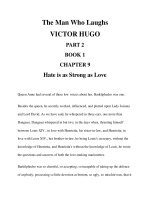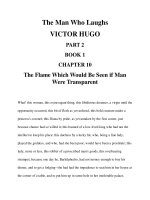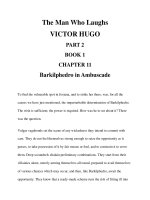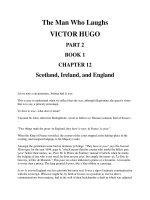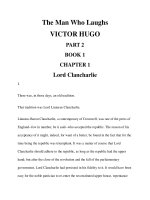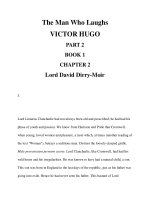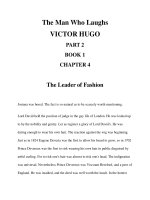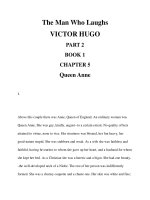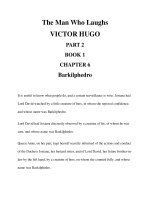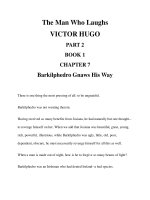The Man Who Laughs Victor Hugo Part 2 Book 7 Chapter 3 ppsx
Bạn đang xem bản rút gọn của tài liệu. Xem và tải ngay bản đầy đủ của tài liệu tại đây (28.71 KB, 10 trang )
The Man Who Laughs
Victor Hugo
Part 2
Book 7
Chapter 3
Eve
An octagon room, with a vaulted ceiling, without windows but lighted by a
skylight; walls, ceiling, and floors faced with peach-coloured marble; a black
marble canopy, like a pall, with twisted columns in the solid but pleasing
Elizabethan style, overshadowing a vase-like bath of the same black marble
this was what he saw before him. In the centre of the bath arose a slender jet of
tepid and perfumed water, which, softly and slowly, was filling the tank. The
bath was black to augment fairness into brilliancy.
It was the water which he had heard. A waste-pipe, placed at a certain height in
the bath, prevented it from overflowing. Vapour was rising from the water, but
not sufficient to cause it to hang in drops on the marble. The slender jet of water
was like a supple wand of steel, bending at the slightest current of air. There
was no furniture, except a chair-bed with pillows, long enough for a woman to
lie on at full length, and yet have room for a dog at her feet. The French, indeed,
borrow their word canapé from can-al-pié. This sofa was of Spanish
manufacture. In it silver took the place of woodwork. The cushions and
coverings were of rich white silk.
On the other side of the bath, by the wall, was a lofty dressing-table of solid
silver, furnished with every requisite for the table, having in its centre, and in
imitation of a window, eight small Venetian mirrors, set in a silver frame. In a
panel on the wall was a square opening, like a little window, which was closed
by a door of solid silver. This door was fitted with hinges, like a shutter. On the
shutter there glistened a chased and gilt royal crown. Over it, and affixed to the
wall, was a bell, silver gilt, if not of pure gold.
Opposite the entrance of the chamber, in which Gwynplaine stood as if
transfixed, there was an opening in the marble wall, extending to the ceiling,
and closed by a high and broad curtain of silver tissue. This curtain, of fairy-like
tenuity, was transparent, and did not interrupt the view. Through the centre of
this web, where one might expect a spider, Gwynplaine saw a more formidable
object a woman. Her dress was a long chemise so long that it floated over her
feet, like the dresses of angels in holy pictures; but so fine that it seemed liquid.
The silver tissue, transparent as glass and fastened only at the ceiling, could be
lifted aside. It separated the marble chamber, which was a bathroom, from the
adjoining apartment, which was a bedchamber. This tiny dormitory was as a
grotto of mirrors. Venetian glasses, close together, mounted with gold
mouldings, reflected on every side the bed in the centre of the room. On the bed,
which, like the toilet-table, was of silver, lay the woman; she was asleep.
The crumpled clothes bore evidence of troubled sleep. The beauty of the folds
was proof of the quality of the material.
It was a period when a queen, thinking that she should be damned, pictured hell
to herself as a bed with coarse sheets.[20]
A dressing-gown, of curious silk, was thrown over the foot of the couch. It was
apparently Chinese; for a great golden lizard was partly visible in between the
folds.
Beyond the couch, and probably masking a door, was a large mirror, on which
were painted peacocks and swans.
Shadow seemed to lose its nature in this apartment, and glistened. The spaces
between the mirrors and the gold work were lined with that sparkling material
called at Venice thread of glass that is, spun glass.
At the head of the couch stood a reading desk, on a movable pivot, with candles,
and a book lying open, bearing this title, in large red letters, "Alcoranus
Mahumedis."
Gwynplaine saw none of these details. He had eyes only for the woman. He was
at once stupefied and filled with tumultuous emotions, states apparently
incompatible, yet sometimes co-existent. He recognized her. Her eyes were
closed, but her face was turned towards him. It was the duchess she, the
mysterious being in whom all the splendours of the unknown were united; she
who had occasioned him so many unavowable dreams; she who had written him
so strange a letter! The only woman in the world of whom he could say, "She
has seen me, and she desires me!"
He had dismissed the dreams from his mind; he had burnt the letter. He had, as
far as lay in his power, banished the remembrance of her from his thoughts and
dreams. He no longer thought of her. He had forgotten her
Again he saw her, and saw her terrible in power. His breath came in short
catches. He felt as if he were in a storm-driven cloud. He looked. This woman
before him! Was it possible? At the theatre a duchess; here a nereid, a nymph, a
fairy. Always an apparition. He tried to fly, but felt the futility of the attempt.
His eyes were riveted on the vision, as though he were bound. Was she a
woman? Was she a maiden? Both. Messalina was perhaps present, though
invisible, and smiled, while Diana kept watch.
Over all her beauty was the radiance of inaccessibility. No purity could compare
with her chaste and haughty form. Certain snows, which have never been
touched, give an idea of it such as the sacred whiteness of the Jungfrau.
Immodesty was merged in splendour. She felt the security of an Olympian, who
knew that she was daughter of the depths, and might say to the ocean, "Father!"
And she exposed herself, unattainable and proud, to everything that should pass-
-to looks, to desires, to ravings, to dreams; as proud in her languor, on her
boudoir couch, as Venus in the immensity of the sea-foam.
She had slept all night, and was prolonging her sleep into the daylight; her
boldness, begun in shadow, continued in light.
Gwynplaine shuddered. He admired her with an unhealthy and absorbing
admiration, which ended in fear. Misfortunes never come singly. Gwynplaine
thought he had drained to the dregs the cup of his ill-luck. Now it was refilled.
Who was it who was hurling all those unremitting thunderbolts on his devoted
head, and who had now thrown against him, as he stood trembling there, a
sleeping goddess? What! was the dangerous and desirable object of his dream
lurking all the while behind these successive glimpses of heaven? Did these
favours of the mysterious tempter tend to inspire him with vague aspirations and
confused ideas, and overwhelm him with an intoxicating series of realities
proceeding from apparent impossibilities? Wherefore did all the shadows
conspire against him, a wretched man; and what would become of him, with all
those evil smiles of fortune beaming on him? Was his temptation prearranged?
This woman, how and why was she there? No explanation! Why him? Why
her? Was he made a peer of England expressly for this duchess? Who had
brought them together? Who was the dupe? Who the victim? Whose simplicity
was being abused? Was it God who was being deceived? All these undefined
thoughts passed confusedly, like a flight of dark shadows, through his brain.
That magical and malevolent abode, that strange and prison-like palace, was it
also in the plot? Gwynplaine suffered a partial unconsciousness. Suppressed
emotions threatened to strangle him. He was weighed down by an
overwhelming force. His will became powerless. How could he resist? He was
incoherent and entranced. This time he felt he was becoming irremediably
insane. His dark, headlong fall over the precipice of stupefaction continued.
But the woman slept on.
What aggravated the storm within him was, that he saw not the princess, not the
duchess, not the lady, but the woman.
Gwynplaine, losing all self-command, trembled. What could he do against such
a temptation? Here were no skilful effects of dress, no silken folds, no complex
and coquettish adornments, no affected exaggeration of concealment or of
exhibition, no cloud. It was fearful simplicity a sort of mysterious summons
the shameless audacity of Eden. The whole of the dark side of human nature
was there. Eve worse than Satan; the human and the superhuman commingled.
A perplexing ecstasy, winding up in a brutal triumph of instinct over duty. The
sovereign contour of beauty is imperious. When it leaves the ideal and
condescends to be real, its proximity is fatal to man.
Now and then the duchess moved softly on the bed, with the vague movement
of a cloud in the heavens, changing as a vapour changes its form. Absurd as it
may appear, though he saw her present in the flesh before him, yet she seemed a
chimera; and, palpable as she was, she seemed to him afar off. Scared and livid,
he gazed on. He listened for her breathing, and fancied he heard only a
phantom's respiration. He was attracted, though against his will. How arm
himself against her or against himself? He had been prepared for everything
except this danger. A savage doorkeeper, a raging monster of a jailer such were
his expected antagonists. He looked for Cerberus; he saw Hebe. A sleeping
woman! What an opponent! He closed his eyes. Too bright a dawn blinds the
eyes. But through his closed eyelids there penetrated at once the woman's form-
-not so distinct, but beautiful as ever.
Fly! Easier said than done. He had already tried and failed. He was rooted to the
ground, as if in a dream. When we try to draw back, temptation clogs our feet
and glues them to the earth. We can still advance, but to retire is impossible.
The invisible arms of sin rise from below and drag us down.
There is a commonplace idea, accepted by every one, that feelings become
blunted by experience. Nothing can be more untrue. You might as well say that
by dropping nitric acid slowly on a sore it would heal and become sound, and
that torture dulled the sufferings of Damiens. The truth is, that each fresh
application intensifies the pain.
From one surprise after another, Gwynplaine had become desperate. That cup,
his reason, under this new stupor, was overflowing. He felt within him a terrible
awakening. Compass he no longer possessed. One idea only was before him
the woman. An indescribable happiness appeared, which threatened to
overwhelm him. He could no longer decide for himself. There was an
irresistible current and a reef. The reef was not a rock, but a siren a magnet at
the bottom of the abyss. He wished to tear himself away from this magnet; but
how was he to carry out his wish? He had ceased to feel any basis of support.
Who can foresee the fluctuations of the human mind! A man may be wrecked,
as is a ship. Conscience is an anchor. It is a terrible thing, but, like the anchor,
conscience may be carried away.
He had not even the chance of being repulsed on account of his terrible
disfigurement. The woman had written to say that she loved him.
In every crisis there is a moment when the scale hesitates before kicking the
beam. When we lean to the worst side of our nature, instead of strengthening
our better qualities, the moral force which has been preserving the balance gives
way, and down we go. Had this critical moment in Gwynplaine's life arrived?
How could he escape?
So it is she the duchess, the woman! There she was in that lonely room asleep,
far from succour, helpless, alone, at his mercy; yet he was in her power! The
duchess! We have, perchance, observed a star in the distant firmament. We have
admired it. It is so far off. What can there be to make us shudder in a fixed star?
Well, one day one night, rather it moves. We perceive a trembling gleam
around it. The star which we imagined to be immovable is in motion. It is no
longer a star, but a comet the incendiary giant of the skies. The luminary
moves on, grows bigger, shakes off a shower of sparks and fire, and becomes
enormous. It advances towards us. Oh, horror, it is coming our way! The comet
recognizes us, marks us for its own, and will not be turned aside. Irresistible
attack of the heavens! What is it which is bearing down on us? An excess of
light, which blinds us; an excess of life, which kills us. That proposal which the
heavens make we refuse; that unfathomable love we reject. We close our eyes;
we hide; we tear ourselves away; we imagine the danger is past. We open our
eyes: the formidable star is still before us; but, no longer a star, it has become a
world a world unknown, a world of lava and ashes; the devastating prodigy of
space. It fills the sky, allowing no compeers. The carbuncle of the firmament's
depths, a diamond in the distance, when drawn close to us becomes a furnace.
You are caught in its flames. And the first sensation of burning is that of a
heavenly warmth.
